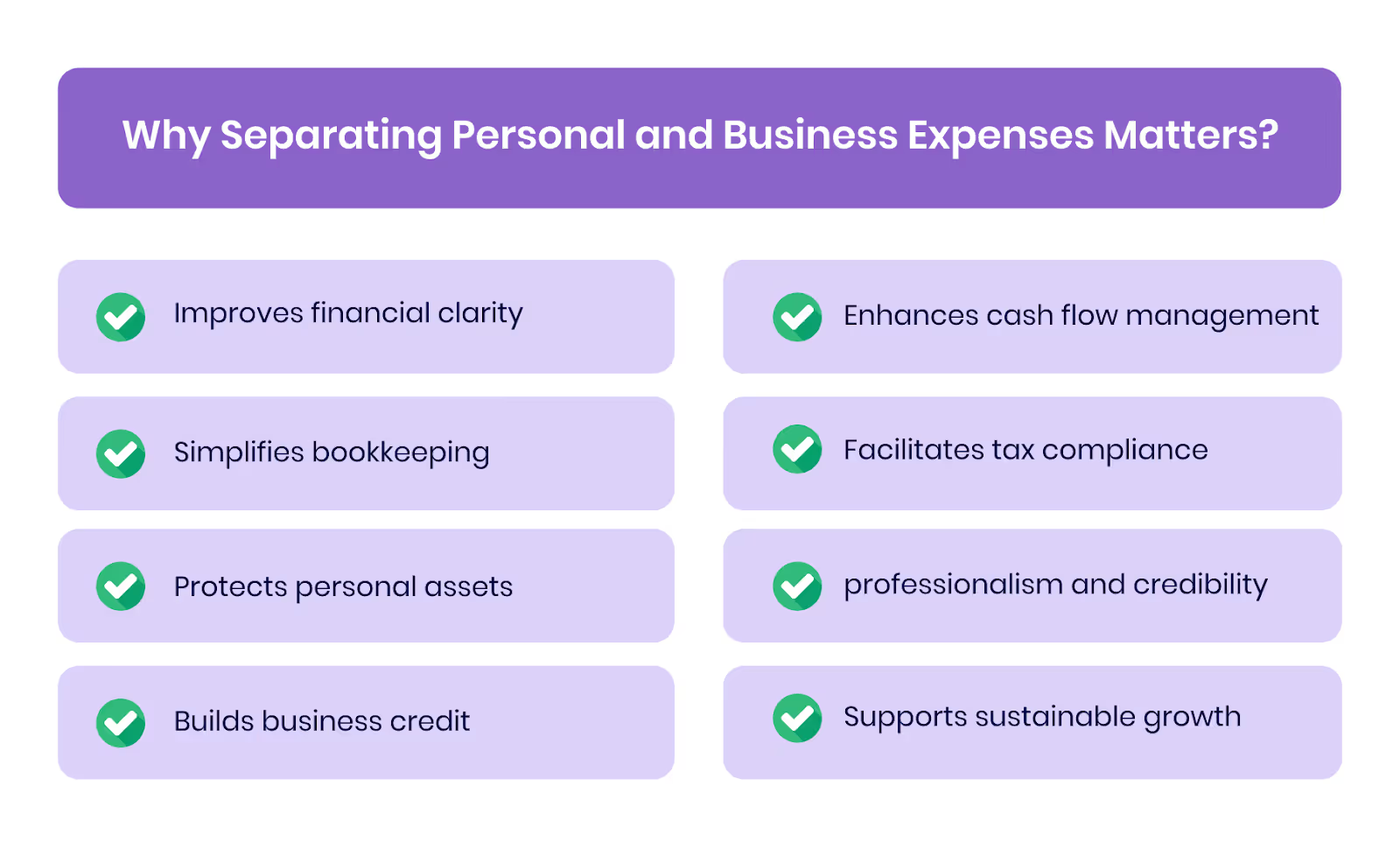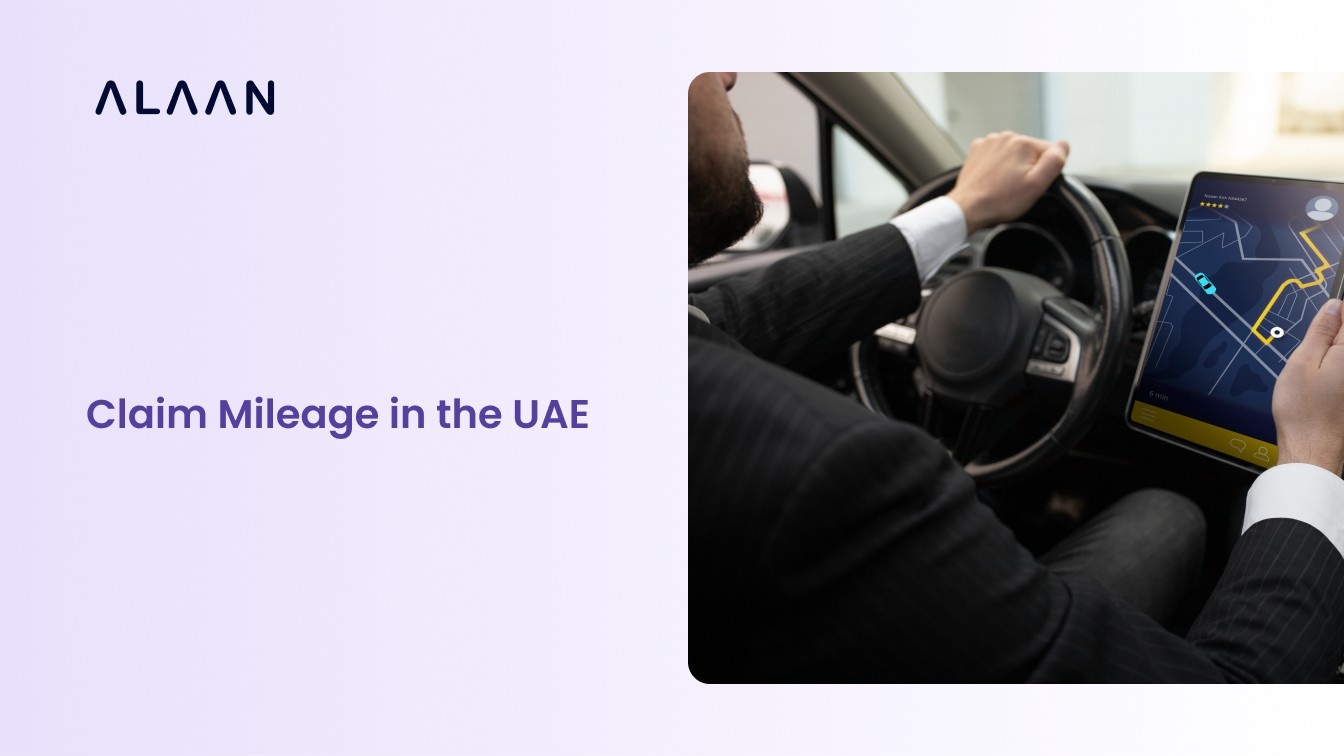Separating personal and business expenses is a crucial practice for SMEs in the UAE aiming to build resilient and scalable businesses. Despite forming 94% of all businesses and contributing over 53% to the country's GDP, more than 60% of SMEs cite lack of finance as their biggest challenge to growth.
One key reason many SMEs face difficulties accessing credit and funding is the mixing of personal and business finances, which undermines financial clarity and weakens creditworthiness.
In this article, we’ll explain why keeping personal and business expenses separate is vital for your business’s financial health.
Key Takeaways:
- Separating personal and business finances is crucial to ensure clear financial records, simplify tax compliance, and protect personal assets.
- Using dedicated business accounts and corporate cards with spend controls helps prevent accidental mixing and improves cash flow visibility.
- Clear expense policies, employee education, and reimbursement protocols maintain discipline and accuracy in financial management.
- Platforms like Alaan automate expense capture, VAT compliance, and reporting, making financial separation effortless and audit-ready.
What Are Personal Finances?
Personal finances cover your individual or household money management, your income, everyday expenses, savings, and debts. These include costs like rent, groceries, utilities, and personal loans.
Clear control over personal finances helps ensure you don’t mix these with business spending, which can complicate your financial management and risk your personal assets.
What Are Business Finances?
Business finances refer to the money management related to your company’s operations. This includes revenue, expenses, payroll, taxes, and investments. Keeping business finances separate ensures accurate record-keeping, simplifies tax filing, and protects personal assets by creating a clear financial boundary between you and your business.
Why Separating Personal and Business Expenses Matters?

Clear separation of personal and business expenses is the key to maintaining clarity and control over your company’s financial health.
- Improves financial clarity: Keeping expenses separate makes tracking income and spending straightforward, helping you understand your business’s true financial health.
- Simplifies bookkeeping: Separate accounts reduce errors, save time, and make accounting and tax filing more accurate.
- Protects personal assets: Clear separation shields your personal finances from business liabilities and legal risks.
- Builds business credit: Establishing distinct business finances improves your chances of accessing loans and funding.
- Enhances cash flow management: Clarity between accounts helps you monitor and manage operational cash flow effectively.
- Facilitates tax compliance: Separate records support accurate tax filings, maximise deductible expenses, and reduce audit risks.
- Boosts professionalism and credibility: Maintaining clean financials enhances trust with banks, investors, and partners.
- Supports sustainable growth: Clear financial management strengthens investor confidence and strategic decisions.
Consequences of Not Keeping Finances Separate
Mixing personal and business expenses can lead to significant challenges for SMEs. Recognising these risks highlights why maintaining clear financial boundaries is crucial.
- Loss of legitimate tax deductions: Mixing expenses complicates identifying deductible costs, increasing tax liabilities and audit risks.
- Complex and error-prone tax filing: Commingled finances make tax preparation difficult, raising the chance of audits and penalties.
- Personal liability exposure: Failure to separate finances can result in “piercing the corporate veil,” making owners personally liable for business debts.
- Credibility damage: Disorganized financial records undermine trust with banks, investors, and partners, restricting funding opportunities.
- Bookkeeping challenges: Mixing funds leads to messy records that impede accurate cash flow monitoring and financial decision-making.
- Operational cash flow confusion: Lack of clarity in finances can cause cash shortages or mismanagement, affecting business continuity.
- Legal risks: Mixing business and personal finances may trigger legal disputes or regulatory scrutiny.
Studies confirm that many SMEs with poor expense separation experience delays in financial closing and struggle with cash flow visibility, impacting business performance.
10 Practical Steps to Separate Personal and Business Expenses

Using the right tools and processes is key to maintaining clear separation between personal and business finances, critical for businesses in the UAE striving for growth and compliance.
1. Use Corporate Cards for Business Spending
Start by issuing corporate cards exclusively for business expenses. These cards offer built-in controls like spending limits, vendor restrictions, and instant blocking, preventing personal purchases on company accounts. Corporate cards simplify transaction tracking, improve cash flow visibility, and cut reconciliation time compared to personal cards.
2. Leverage a Spend Management Platform
Adopt a dedicated spend management platform that integrates with your corporate cards and accounting systems. Such platforms automate expense approvals, receipt capture, VAT compliance, and real-time reporting. For SMEs, this technology drastically reduces manual work, enforces spending policies, and keeps financial data clean and audit-ready.
3. Open Separate Bank Accounts and Cards
Maintain dedicated business bank accounts to manage income and expenses independently from personal finances. This segregation is essential for accurate bookkeeping and ease during tax season.
4. Put Your Business on the Map
Form a legal business entity (LLC, Corporation) and register with the relevant authorities. This formalizes your company as a separate financial entity and builds credibility with lenders and investors.
5. Pay Yourself a Salary
Transfer a fixed salary regularly from your business account to your personal account. This practice defines a clear separation between business revenue and personal income, aiding budgeting and compliance.
6. Track and Separate Receipts
Organize personal and business receipts distinctly, ideally using digital tools to simplify bookkeeping and document retention.
7. Establish Clear Expense Policies
Define what qualifies as a business expense, communicate policies clearly, and train employees to ensure compliance. This governance reduces accidental mixing and encourages disciplined spending.
8. Reimburse Personal Funds Used for Business
When you pay business expenses personally, reimburse promptly and document every transaction thoroughly to keep financial records transparent and accurate.
9. Track Shared and Personal Usage
Document when personal assets or expenses are partly used for business to ensure compliant allocation and maximise deductions.
10. Educate Employees and Partners
Ensure everyone involved understands and follows your financial separation policies to maintain rigorous financial control.

How Alaan Supports Expense Separation and Financial Control
Alaan is the Middle East’s leading AI-powered spend management platform designed to help SMEs maintain strict separation between personal and business expenses with ease and precision.
- Smart Corporate Cards: Instantly issue unlimited physical, virtual, and single-use corporate cards with customizable spending limits, merchant restrictions, and category-based controls. These cards limit spending strictly to business purposes and allow instant blocking of unauthorized transactions.
- Automated Expense Capture: Alaan’s AI automatically extracts and matches expense data, capturing VAT, TRN, vendor details, and receipts with near 100% accuracy, eliminating manual entry and reducing errors.
- Seamless ERP and Accounting Integration: The platform integrates smoothly with major ERPs and accounting software like QuickBooks, Xero, and Oracle NetSuite, enabling automatic expense posting and reconciliation to save time and improve accuracy.
- Customizable Approval Workflows: Tailor approval flows for departments or individuals to enforce expense policies effectively, ensuring only compliant spending is authorized.
- Real-Time Visibility and Alerts: Finance teams get live dashboards and instant transaction alerts that provide total spend transparency and control. This empowers quick response to potential overspending or fraud.
- Compliant VAT Management: By automating VAT extraction and record-keeping, Alaan simplifies tax filing and helps avoid penalties.
Conclusion
Keeping personal and business expenses separate is key to managing your SME’s finances smoothly and avoiding surprises during tax time. It protects your personal assets and makes it easier to track where your money goes.
Simple practices like using corporate cards and clear policies go a long way, while Alaan automates the tedious parts, letting you focus on growing your business confidently.
Start separating your expenses today to gain better control and peace of mind.
Frequently Asked Questions (FAQs)
Q. Why is separating personal and business expenses crucial for SMEs?
Mixing these expenses can create confusion in bookkeeping, increase the risk of tax audits, and potentially expose your personal assets to business liabilities. Clear separation ensures accurate financial reporting, helps maintain professionalism, and improves access to credit and investors.
Q. What are the risks of using personal cards or accounts for business purchases?
Using personal accounts for business complicates tracking and reconciling transactions, potentially leads to missed tax deductions, and blurs legal financial boundaries. It increases audit risks and may weaken your business’s credibility with banks and investors.
Q. How does using corporate cards and platforms like Alaan help?\
Corporate cards prevent unauthorized spending by enforcing limits and controls at the card level. Alaan’s platform automates expense capture, VAT extraction, and approval workflows, integrating seamlessly with accounting software to provide real-time visibility and reduce manual errors.
Q. Does this separation apply to all types of businesses?
Yes. Whether you’re a sole proprietor, freelancer, or have a corporation, separating finances simplifies taxes, protects you legally, and strengthens financial management.
Q. Can separating expenses improve my chances of getting a loan or investment?
Absolutely. Lenders and investors prefer businesses with transparent, well-organized financial records. Clear separation signals strong financial discipline and reduces perceived lending or investment risk.


.avif)







%201.avif)